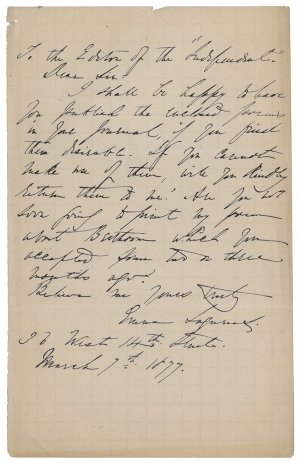|
Emma Lazarus, Author of the Statue of Liberty Welcoming Poem “The New Colossus,” Writes About Publication of Her Poems |
Click to enlarge:

Emma Lazarus offers new poems to The Independent, a weekly Congregational magazine published in New York City. She also inquires about her poem on Beethoven, which the magazine had already accepted, and eventually published in July 1877.
In 1883, she wrote the sonnet “The New Colossus” to help raise money for the construction of a pedestal for the Statue of Liberty. Ultimately, in 1903, the poem was cast into a bronze plaque mounted inside the pedestal’s lower level.
Rarity
Lazarus's letters are seldom seen on the market, in part due to her premature death in 1887, at age 38. In 1919, New York’s renowned Anderson Galleries noted, “The mss. of this author...are practically unobtainable. This is the first Emma Lazarus ms. essay ever offered at auction....” In his classic 1961 book on autographs, Charles Hamilton observed, “Not many autographs are so desirable as that of Emma Lazarus.... Her autograph is extremely rare.” The few extant Lazarus autographs to reach the market mostly did so in the twentieth century, between 1910 and 1980. Our letter is the first Lazarus autograph on the market since the 2002 sale at R.M. Smythe of an autograph fair copy signed of “The New Colossus.”
EMMA LAZARUS.
Autograph Letter Signed, to [Henry C. Bowen], Editor,
Independent, March 7, 1877, New York, NY. 1 p., 5 x 8 in.
Inventory #27695
ON HOLD
Complete Transcript
To the Editor of the “Independent.”
Dear Sir:
I shall be happy to have you publish the enclosed poems in your Journal, if you find them desirable. If you cannot make use of them, will you kindly return them to me? Are you not soon going to print my poem about Beethoven which you accepted some two to three months ago.
Believe me yours truly,
Emma Lazarus.
36 West 14th Street.
March 7th 1877.
Historical Background
Lazarus’ “Comœdia” title was based on Beethoven’s reputed last words: “Plaudite, amici, Comœdia finita est.” (Applause, friends, the comedy is over.) It was published in The Independent on July 26, 1877, filling nearly the entire front page.
Music played an important part in Lazarus’s brief life. She was known to listen to Beethoven and Bach for solace during periods of illness. In addition to the poem about Beethoven mentioned in this letter, she also dedicated three sonnets to Frederic Chopin. In November 1878, she published a poem entitled “Symphonic Studies” Lippincott’s Magazine of Popular Literature and Science.
Emma Lazarus (1849-1887) was born in New York City into a Sephardic Jewish family. Most of her ancestors had emigrated from Portugal. Privately educated by tutors, she studied American and British literature and several languages, including French, German, and Italian. Stimulated to write by the Civil War, between the ages of fourteen and seventeen, she published a collection of Poems and Translations in 1867. Throughout the 1870s, her poems were published in several magazines, especially Lippincott’s Monthly and Scribner’s Monthly. She also wrote prose and translated poems and other works into English, especially those of Johann Wolfgang von Goethe and Heinrich Heine. Beyond writing, Lazarus was involved in aiding Jewish refugees fleeing pogroms in Eastern Europe. She supported the reforms advocated by American political economist Henry George and the “single tax” movement for land value tax. Her last collection, Songs of a Semite: The Dance to Death and Other Poems (1882), is considered the first volume of Jewish American poetry. She twice traveled to Europe, in 1883 and again from 1885 to 1887. She returned from her second seriously ill, and died two months later, likely from Hodgkin’s lymphoma.
Henry Chandler Bowen (1813-1896) was born in Connecticut and educated at private academies. He moved to New York City and worked for a dry goods company owned by abolitionist Arthur Tappan. He later opened his own company, specializing in silks. In 1848, he was one of the founders of The Independent, closely associated with Plymouth Church in Brooklyn Heights. In 1853, he founded the Continental Insurance Company. During the Civil War, Bowen lost most of his clients, many of whom were in the South, and his company went bankrupt. He edited The Independent from 1870 until his death.
The Independent (1848-1928) was a weekly magazine published in New York City to promote Congregationalism. It also advocated abolitionism, a stance that initially hurt its circulation, and women’s suffrage. In 1861, Henry Ward Beecher became the editor, assisted by Theodore Tilton, who succeeded Beecher in 1863. It also published poetry and literary works by many authors including Elizabeth Barrett Browning, Harriet Beecher Stowe, Emma Lazarus, John Greenleaf Whittier, and James Russell Lowell. Henry C. Bowen succeeded Tilton as editor and publisher until his death in 1896. In the twentieth century, the magazine devoted less attention to religion and more to politics and illustrations. It moved to Boston in 1924 but was unsuccessful and merged with The Outlook in 1828.
Condition: On a paper leaf with an unusual all-over checkerboard watermark. This may have been a retained contemporaneous copy; expected wear including even toning and isolated edge darkening; a few tiny scattered chips and closed tears affecting the top and left edges.
Provenance: Ex-Ben Bloomfield of University Place, NY, NY; then in the same collection for more than six decades.